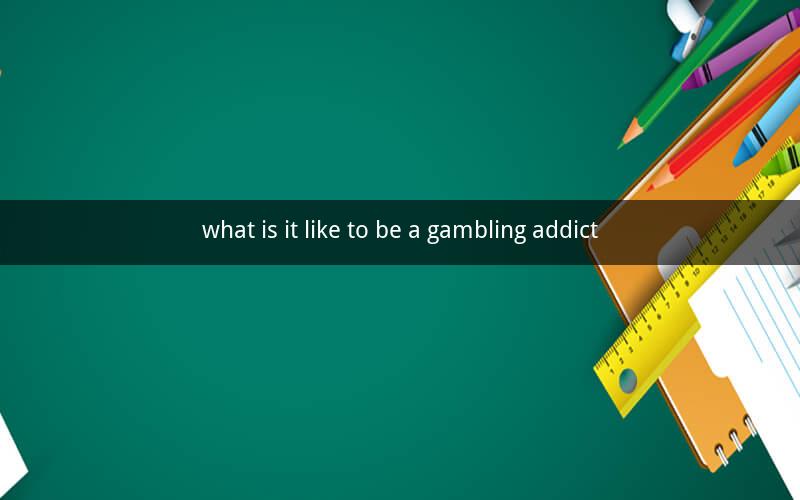
Table of Contents
1. Understanding Gambling Addiction
2. Signs and Symptoms
3. Causes of Gambling Addiction
4. The Psychological Impact
5. The Social and Financial Consequences
6. Treatment and Recovery
7. Support and Resources
8. Preventing Gambling Addiction
9. The Role of Technology
10. Personal Stories and Testimonials
---
1. Understanding Gambling Addiction
Gambling addiction, often referred to as problem gambling or compulsive gambling, is a behavioral disorder characterized by the inability to control or stop gambling despite negative consequences. It is a complex condition that affects individuals from all walks of life, regardless of age, gender, or socioeconomic status.
2. Signs and Symptoms
Identifying gambling addiction can be challenging, as it often progresses gradually. Common signs and symptoms include:
- Continual desire to gamble, often at increasing stakes
- Feeling restless or irritable when unable to gamble
- Spending more time and money on gambling than intended
- Repeated failed attempts to stop gambling
- Risking or losing relationships, jobs, or education due to gambling
- Using gambling as a way to cope with stress or other negative emotions
3. Causes of Gambling Addiction
The development of gambling addiction is influenced by a combination of factors, including:
- Genetic predisposition
- Environmental influences, such as exposure to gambling opportunities
- Personality traits, such as thrill-seeking or impulsivity
- Psychological factors, such as low self-esteem or the need for validation
4. The Psychological Impact
Gambling addiction can have severe psychological consequences, including:
- Depression and anxiety
- Mood swings and emotional instability
- Relationship problems
- Suicidal thoughts and behaviors
5. The Social and Financial Consequences
The social and financial impacts of gambling addiction can be devastating. Some common consequences include:
- Financial ruin, including bankruptcy and loss of savings
- Job loss and career disruption
- Divorce and family breakdown
- Legal problems, such as theft or fraud
6. Treatment and Recovery
Treatment for gambling addiction typically involves a combination of therapy, support groups, and lifestyle changes. Common treatment approaches include:
- Cognitive-behavioral therapy (CBT) to address the thought patterns that contribute to gambling
- Family therapy to rebuild relationships and address family issues
- Support groups, such as Gamblers Anonymous
- Medication, in some cases, to treat co-occurring mental health disorders
7. Support and Resources
There are numerous support and resources available for individuals struggling with gambling addiction, including:
- National helplines and hotlines
- Online support groups and forums
- Professional counseling services
- Self-help books and websites
8. Preventing Gambling Addiction
Preventing gambling addiction involves a variety of strategies, such as:
- Setting personal limits on gambling time and money
- Avoiding risky situations and environments
- Seeking help if gambling starts to cause problems
- Educating oneself about the risks of gambling
9. The Role of Technology
Technology has both positive and negative impacts on gambling addiction. While it can provide access to a wider range of gambling opportunities, it also offers tools for responsible gambling, such as self-exclusion programs and deposit limits.
10. Personal Stories and Testimonials
Hearing the stories of individuals who have overcome gambling addiction can be inspiring. These stories often highlight the importance of seeking help and the potential for recovery.
---
Questions and Answers
1. Q: What is the primary difference between problem gambling and gambling addiction?
A: The primary difference lies in the severity of the symptoms and the negative impact on the individual's life. Problem gambling can be a mild form of the disorder, while gambling addiction is more severe and has a significant impact on various aspects of life.
2. Q: Can gambling addiction be treated successfully?
A: Yes, gambling addiction can be treated successfully, although it may require ongoing support and management. Many individuals have recovered and gone on to lead fulfilling lives.
3. Q: Is there a cure for gambling addiction?
A: There is no cure for gambling addiction, but it is a treatable disorder. With the right combination of treatment and support, individuals can learn to manage their addiction and reduce its impact on their lives.
4. Q: How common is gambling addiction?
A: The prevalence of gambling addiction varies by region and demographic, but estimates suggest that it affects a small percentage of the general population.
5. Q: Can someone develop a gambling addiction without being addicted to other substances?
A: Yes, gambling addiction can occur independently of other substance addictions. It is a behavioral addiction that can affect individuals with or without other addictions.
6. Q: Are there any genetic factors that contribute to gambling addiction?
A: Yes, research suggests that there may be a genetic predisposition to gambling addiction, although environmental and psychological factors also play a significant role.
7. Q: Can children develop gambling addiction?
A: While children are less likely to develop gambling addiction, it is not impossible. Early exposure to gambling and risky behaviors can increase the risk of developing a gambling addiction later in life.
8. Q: How can someone tell if a friend or family member has a gambling problem?
A: Look for signs such as increased time spent gambling, secretive behavior, financial problems, and changes in mood or relationships.
9. Q: What should someone do if they suspect they have a gambling problem?
A: Seek help from a healthcare professional, counselor, or support group. It's important to acknowledge the problem and take steps to address it.
10. Q: Is there a risk of relapse for individuals with gambling addiction?
A: Yes, there is a risk of relapse for individuals with gambling addiction, similar to other addictions. It's important to continue with treatment and support to reduce the risk of relapse.